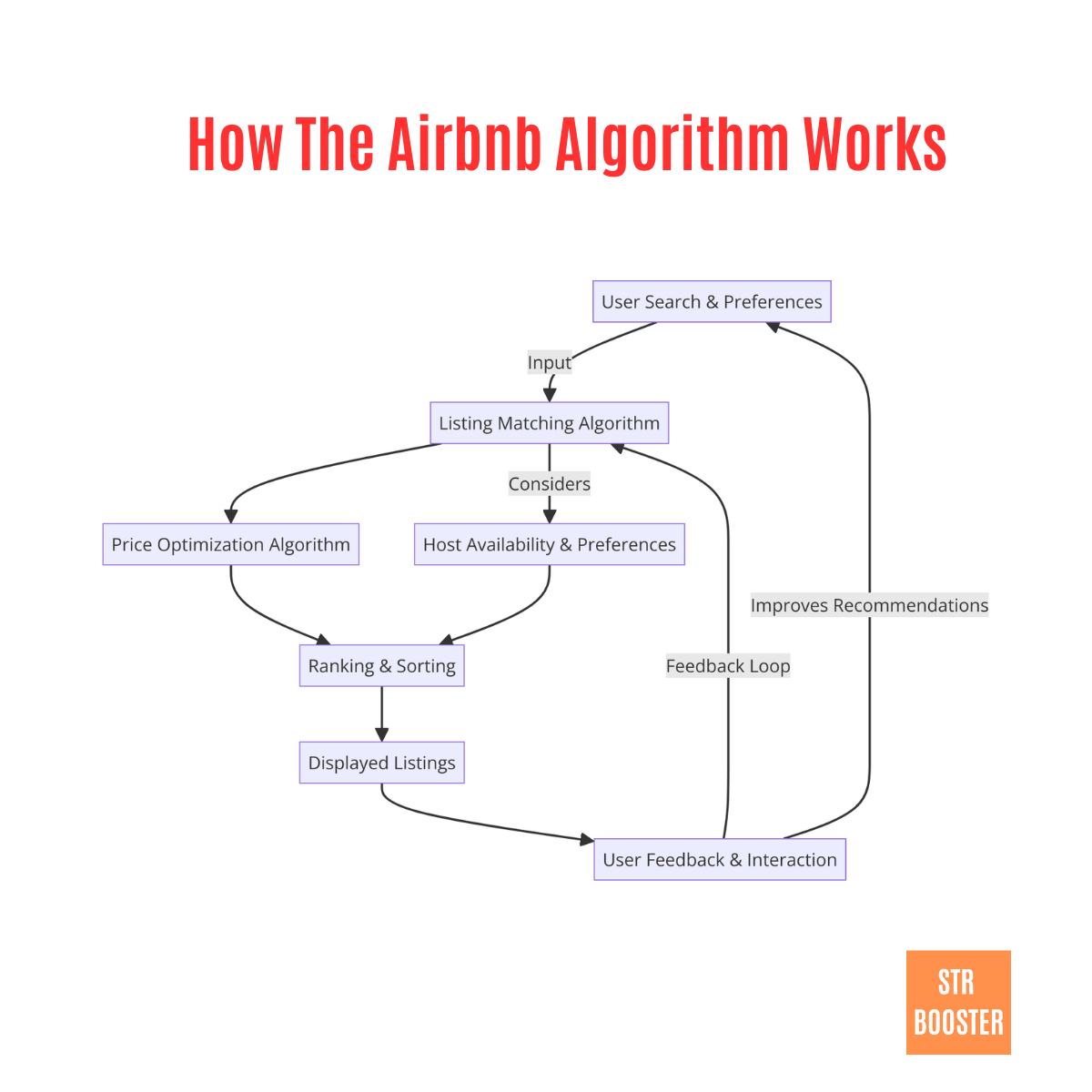Knowing how to rank high on Airbnb is crucial in a marketplace with millions of active options vying for attention. Achieving a higher rank in search results is not merely a result of chance; it’s the outcome of understanding how Airbnb’s algorithm works and implementing strategies to align with its metrics. Airbnb’s search algorithm differs from traditional search engines in that it doesn’t rely heavily on keywords but instead aims to match guest searches with hosts that can meet their needs effectively.

To stand out, hosts must focus on creating an engaging listing with high-quality images, detailed descriptions, and regular updates. Comprehending the underlying factors that boost a listing’s prominence is key—these include a strong track record of positive reviews, a high response rate, and maintaining an updated calendar. Beyond the listing itself, providing guests with a stellar experience contributes to higher rankings, as satisfied guests are likely to leave positive reviews and recommend the listing to others.
Key Takeaways
- Achieving high visibility requires aligning with Airbnb’s unique search algorithm.
- Engaging and up-to-date listings have a competitive edge.
- Exceptional guest experiences are integral to ranking success.
Understanding Airbnb’s Ranking Algorithm
Airbnb’s ranking algorithm is sophisticated and considers various factors to determine the placement of listings in search results. Understanding these nuances can help hosts optimize their listings for better visibility.

Criteria That Impact Your Listing’s Visibility
Several key criteria significantly influence how a listing ranks on Airbnb. Firstly, response time is crucial; hosts are encouraged to reply to booking inquiries as swiftly as possible, ideally within 10 minutes and not exceeding an hour. Secondly, the accuracy of the listing details can affect rankings. It is vital to ensure that descriptions and photos precisely represent the property. Here is a brief overview:
- Response Time: Reply within an hour.
- Listing Accuracy: Ensure descriptions and photos reflect the current state of the property.
Search Relevance and Guest Preferences
Airbnb also tailors search results to match guest preferences, booking history, and data from previous bookings. For a listing to rank higher, it must align with the diverse criteria guests may seek. Two essential components here are:
- Guest Preferences: Tailor your listing to align with common preferences.
- Booking History: Consider the trends in guests’ previous bookings to optimize your listing’s appeal.
Creating an Appealing Listing
To rank high on Airbnb, hosts must create a listing that stands out to potential guests. This involves attention to detail in presenting the property, clear and timely communication, and competitive pricing strategies.
Professional-Quality Photos
High-resolution, well-lit images are crucial as they provide the first impression of the property. Hosts should ensure that photographs represent the space accurately while showcasing its best features. For example:
- Living Area: Capture the full size and include any unique decor.
- Bedrooms: Use natural light and tidy up to create an inviting atmosphere.
- Outdoor Spaces: Highlight any scenic views or amenities.
A Detailed and Honest Description
The description must be comprehensive, highlighting all amenities and features while remaining truthful to avoid guest disappointment. Key points to include are:
- Space Layout: Clearly outline the number of bedrooms, bathrooms, and particular areas like a home office.
- Location Perks: If the property is close to attractions or transport hubs, mention these prominently.
Setting Competitive Prices
Researching similar listings can inform a strategic pricing structure that is attractive to guests and reflects the property’s value. Hosts can consider:
- Peak vs. Off-Peak Rates: Adjust prices according to yearly demand fluctuations.
- Special Offers: Introduce discounts for longer stays to encourage extended bookings.
Updating Your Calendar Regularly
A current calendar reflects the host’s responsiveness and helps potential guests in their planning. Frequent updates can also positively influence the listing’s search position. Specific practices include:
- Blocking Out Dates: Immediately block dates that are no longer available.
- Seasonal Adjustments: Reflect any seasonal availability changes as soon as possible.
See also: Airbnb SEO: 8 Ways To Optimize Your Listing and Boost Bookings
Enhancing Guest Experience
To rank high on Airbnb, hosts focus on delivering an outstanding guest experience, attracting more bookings and elevating the listing’s position on the platform.
Offering Exceptional Hospitality
Exceptional hospitality begins with a host’s attentiveness to guests’ needs. Communication is vital, ensuring guests feel welcomed even before arrival. This could involve sending a personalized welcome message, providing clear check-in instructions, or sharing local recommendations. Physically, a well-maintained, clean space invites comfort and satisfaction—every detail contributes to overall guest perception.
Maintaining High Response Rates
A high response rate demonstrates a host’s commitment and reliability. Hosts should aim to reply to inquiries and reservation requests promptly, ideally within a few hours. This responsiveness will be reflected in the listing’s metrics, influencing its search ranking and potential guests’ decision-making.
- Inquiry Response: Less than 1 hour – Ideal
- Reservation Request Response: 1-2 hours – Acceptable
Accumulating Positive Reviews
Positive reviews significantly impact a listing’s ranking on Airbnb:
- Encourage guests to leave a review by following up post-stay with a thank you message.
- Address any feedback constructively and implement improvements where necessary.
- Aim for a high overall rating; this directly correlates with higher search visibility.
Note: Airbnb evaluates the number and recency of reviews when determining search rankings.
Providing Extra Amenities
Enhanced amenities can set a listing apart. Hosts can offer:
- Essentials: Wi-Fi, towels, pillow, bed linens
- Extras: Welcome basket, local guides, or Netflix access
These offerings can make a stay more enjoyable, likely leading to better reviews and a more favorable ranking on Airbnb.
Leveraging Promotions and Discounts
To rank high on Airbnb, hosts can strategically use promotions and discounts to enhance visibility and attractiveness. These offerings can incentivize guests and lead to increased bookings.
Last-Minute Deals
Last-minute deals can attract guests who are making spontaneous travel plans. Hosts can set a discount for dates fast approaching, ensuring their listing remains competitive. Guests often search for such discounts when booking a stay on short notice.
Long-Term Stay Discounts
Hosts can offer long-term stay discounts to guests planning extended trips. This incentivizes bookings of several weeks to months, providing guests with a reduced rate for lengthier stays. It not only fills the calendar but also minimizes guest turnover, reducing the effort in managing the property.
Maximizing Occupancy
To achieve high occupancy rates on Airbnb, hosts must embrace strategies that cater to fluctuating market demands and minimize downtime due to cancellations.
Adapting to Seasonal Demand
Understanding and adapting to seasonal demand is crucial for maintaining a high occupancy rate. Hosts can monitor travel trends and local events to anticipate busy periods. To attract guests, they should adjust their pricing strategy accordingly, with higher rates during peak seasons and competitive pricing during off-peak times. Additionally, tailoring their listing to seasonal needs—such as providing air conditioning during summer or a cozy fireplace in winter—can increase appeal.
Managing Cancellations Effectively
Effective cancellation management can help maintain high occupancy. Hosts should have a clear and fair cancellation policy that protects their interests while not deterring potential guests. Offering partial refunds or the option to rebook can mitigate the impact of cancellations. Moreover, hosts can take advantage of Airbnb’s automated rebooking tools and keep their calendars up to date to ensure that vacated slots are promptly available to new guests.
Harnessing the Power of Data

Effective Airbnb listing optimization relies heavily on a data-driven approach. Hosts can significantly enhance their listing’s visibility and booking potential by closely monitoring performance metrics and staying attuned to market trends.
Tools like Rankbreeze (see our Rankbreeze Review) are extremely valuable in revealing critical Airbnb data.
See also: Rankbreeze vs. Pricelabs: Which works best for Short-Term Rentals
Tracking Your Listing’s Performance
Hosts should diligently track booking data, including booking dates, length of stay, and number of guests. This data provides insights into popular booking periods and enables hosts to optimize their pricing and availability settings. Regularly analyze:
- Occupancy Rates: Percentage of nights booked vs. available.
- Average Daily Rate (ADR): The average price of booked nights.
- Reviews: Quality and quantity can affect search rankings.
Identifying patterns, such as high-demand weekdays or seasons, allows hosts to tailor their strategies effectively.
Staying Informed About Market Trends
Understanding and adapting to current market trends is crucial. Hosts should:
- Observe search suggestions on Airbnb to see common search terms associated with their location.
- Evaluate competitor listings to ascertain what makes a listing successful in terms of rank and booking frequency.
- Use tools to analyze algorithmic data from prior bookings across the platform.
Keeping abreast of these trends and making data-informed adjustments to listing descriptions and offerings helps a property meet the preferences of a broader guest demographic.
Optimizing Your Airbnb Business Strategy
A successful Airbnb business strategy hinges on robust guest communication and adaptive pricing. Mastery in these areas can significantly enhance a property’s visibility and attractiveness to potential guests.
Building a Strong Guest Communication Protocol
Effective communication with guests is paramount. Property owners should initiate contact promptly after a booking is confirmed. They must ensure a seamless check-in experience by providing clear instructions and addressing any queries guests may have before and during their stay. Maintaining a quick response rate is not only appreciated by guests but also rewarded by Airbnb’s search algorithm.
Implementing Dynamic Pricing Strategies
Property owners should employ dynamic pricing strategies to optimize their income. This involves adjusting prices based on various factors such as seasonality, local events, and overall demand. They can utilize tools like Pricelabs that analyze market trends and suggest optimal pricing. A balance between competitive pricing and maximizing revenue should be the target. Here’s a simple strategy table:
| Factor | Strategy |
|---|---|
| High Demand | Increase price to match demand |
| Low Season | Offer discounts to attract bookings |
| Local Events | Adjust prices according to event proximity and type |
| Last-minute Bookings | Offer discounts to fill calendar gaps |
Building a Brand Beyond Airbnb

Airbnb hosts can secure a competitive edge and achieve sustainable success by establishing a personal brand that resonates with their target audience and extends across multiple platforms. A strong brand can help hosts create memorable experiences encouraging repeat bookings and positive reviews.
Expanding Your Online Presence
A host should establish a presence on various social media platforms to showcase their rental’s unique qualities and the experiences they offer. Platforms like Instagram, Facebook, and Pinterest can be particularly effective for visual storytelling and engaging potential guests. For instance:
- Instagram: Share high-quality images and stories highlighting the property’s best features and nearby attractions.
- Facebook: Create a page for the property to share updates, gather reviews, and communicate with guests.
- Pinterest: Use boards to showcase decoration ideas, local sights, and travel tips that align with the rental’s theme.
Furthermore, participation in relevant online communities and travel forums can drive direct traffic to the host’s listing and help establish their reputation as a knowledgeable and accessible property owner.
Developing Direct Booking Channels
In addition to leveraging social media, hosts can benefit from setting up their direct booking website. This allows guests to book a stay without the fees associated with Airbnb, which can be a strong incentive. Critical elements of a direct booking website include:
- Easy Navigation: Ensure the website is user-friendly, with a clear path to booking rooms.
- SEO Optimization: Use targeted keywords and meta descriptions to improve search engine rankings and visibility.
- Secure Payment Gateway: Integrate a reliable and secure system for processing payments.
By diversifying their booking channels, hosts can cultivate a more stable and direct relationship with their clientele, reducing reliance on third-party platforms.
Frequently Asked Questions
In this section, you will discover critical variables that affect Airbnb search rankings and strategies for optimizing these factors to boost visibility and appeal to potential guests.
What factors influence my search ranking on Airbnb?
Search rankings on Airbnb are determined by various factors, including guest preferences, booking history, listing accuracy and quality, response rates, cancellation rates, and overall guest satisfaction.
How can I improve my guest ratings and reviews on Airbnb?
Hosts can enhance their guest ratings by providing exceptional service, maintaining accurate and detailed listings, offering a clean and well-equipped space, and responding swiftly to guest inquiries and concerns.
What SEO strategies can increase my visibility on Airbnb?
To increase their listing visibility on Airbnb, hosts should incorporate relevant keywords in their listing title and description, craft an appealing and clear summary, and use high-quality photos that accurately reflect the property’s features.
How can I update my listing to perform better against the Airbnb algorithm?
Hosts should regularly update their calendars for accuracy, respond quickly to guest inquiries, keep pricing competitive, optimize their listing descriptions for relevant keywords, and gather more positive reviews to improve their performance in Airbnb’s search algorithm.
How do changes in Airbnb’s algorithm affect my listing’s search ranking?
When Airbnb updates its algorithm, it could impact a listing’s visibility positively or negatively, depending on how the changes align with the host’s current listing status, the property’s popularity, pricing, and guest experience.
What content should I emphasize in my Airbnb listing for better SEO outcomes?
To improve SEO outcomes, hosts should emphasize unique selling points, detailed descriptions, high-quality images, and guest reviews in their content. Regularly updating content to reflect current amenities or improvements can also help maintain strong SEO performance.
See also: Airbnb SEO: Proven Strategies for Boosting Visibility and Bookings